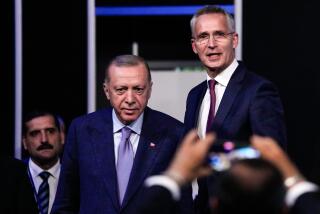Keep Islamists in the Fold
- Share via
In a bizarre piece of political theater, Libya’s quixotic Moammar Kadafi seems to have delivered a significant political blow to the standing of Turkey’s first Islamist prime minister, Necmettin Erbakan, who had openly sought to relieve Kadafi’s isolation and to sharply improve Turkey’s relations across the board with all Muslim countries. Kadafi shocked an unwary Erbakan and his entourage at a press conference in Libya with a public call for a Kurdish separatist state in Turkey and for Turkey to abandon its ties to NATO and the West. This reference to Ankara’s greatest single internal problem greatly embarrassed Erbakan and has prompted calls for his resignation.
Washington can probably ill conceal its glee that the leader of Turkey’s Islamist Welfare Party may be in a process of self-destruction. Indeed, Erbakan created controversy with a trip to Iran that flew in the face of Washington’s strict policies on isolating Tehran.
One can only speculate why Kadafi chose to embarrass an Islamist leader coming from a NATO country willing to assist in alleviating Libya’s isolation in a U.S.-backed embargo. Kadafi may have wished to avoid dealing with Ankara’s request for some $300 million that he owes Turkish contractors. More likely, he could not resist slamming even a sympathetic Turk for Ankara’s decades of pro-Western policies and its more recent limited defense agreement with Israel. By any standard, however, Kadafi has not helped his own cause by rejecting this notable olive branch. Erbakan’s own ideologically driven policies now look amateur and foolish and have sparked a political crisis in Turkey.
Firmly secular policies had dominated Turkey’s political system for more than 70 years, until this past summer, when Erbakan’s party, based on a 21% plurality, formed its first coalition government. It was an extraordinary first in Turkish politics in creating a new “culture war” between ideological secularists and Islamists in Turkey, traditionally a close ally of the U.S.
But apart from the amusing diplomatic gaffe afflicting the Welfare Party’s early formal forays into international relations, much broader forces are at work in Turkey today, with major consequences. With the collapse of the Soviet Union, Turkey’s geopolitics have been transformed. Once almost isolationist and oriented toward the West, Turkey now has new options in the Balkans, Caucasus and Central Asia, long frozen under Soviet rule. Turks are not yet used to this kind of more adventuresome and visionary foreign policy that even contains slight overtones of pan-Turkism.
At the same time, Turkey has been facing a growing domestic crisis from its own sizable Kurdish population, which demands recognition of its ethnic identity and is supported by a nasty insurgency.
However much a fiasco Erbakan’s Libya trip may have been, Washington would be ill-advised to imagine these events as just an aberration from the traditional realities in Turkey. Turkey is gradually being transformed in ways that directly affect U.S. interests in the region. The United States can no longer count on Turkey’s automatic acquiescence. Turkey’s relations with its neighbors are now much more vital to Ankara. While Erbakan is driven by a clearly Islamist political agenda that downplays the West, he is almost surely establishing new markers in independent foreign policy for his country. His successors may not visit the redoubtable Kadafi again in a hurry, but they probably will persist in pursuing a greater independence than Washington is comfortable with.
Even if Erbakan faces an early vote of no confidence in parliament, a major precedent has been set. The first democratically elected Islamist government in the Middle East will have demonstrated that Islamic parties can play by the rules of democratic policies. It is important that the mystique of Islam in politics among the common people be lifted so that Islamist parties can be seen for what they are, no better and perhaps no worse than many other parties that are voted in and out of power. When Islamist parties can become “normal” rather than fervid revolutionary parties, then perhaps other countries suffering from Islamist crises, including Algeria, Egypt and Bahrain, can take heart from Turkey’s experiment.
More to Read
Sign up for Essential California
The most important California stories and recommendations in your inbox every morning.
You may occasionally receive promotional content from the Los Angeles Times.













